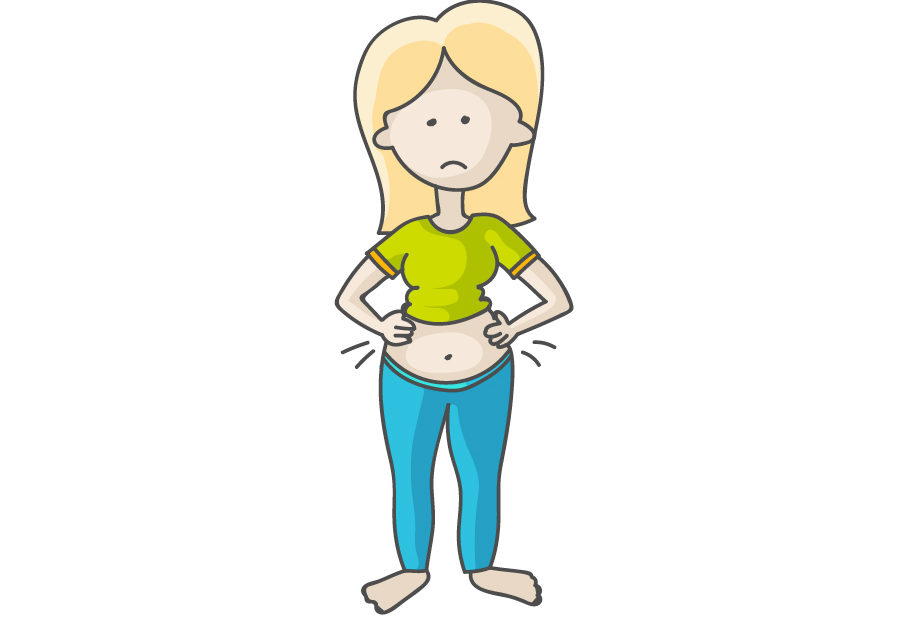Whilst we’re all guilty of a little over indulgence sometimes, it is not always what we eat that is responsible for our waistlines. For those of you who’ve been working hard to shift that last bit of belly fat it can seem like nothing will work and unfortunately, dieting and exercise just aren’t going to cut it. It’s not all bad news though, as the secret to a flat tummy is actually reducing your stress levels! Whether it comes from bad sleep, a poor diet, or just day to day life, stress affects all of us at some point and consistent stress is an important factor in determining your abdominal fat deposits.
How does stress affect belly fat?
You may be wondering how stress – a condition seemingly associated with the brain – is influencing your belly fat. Well, stress actually has a physical effect on the body due to the production of hormones involved in the stress response. Adrenaline and cortisol are important hormones in your stress response, being involved in that famous flight or fight response you’ve probably heard about (and experienced!). But whilst they’re great in determining decisions and focusing the body in one off, short term situations, their constant presence in the body isn’t beneficial.
Stress indirectly influences our belly fat due to the effect of these stress hormones on our brains. Not only do they interfere with appetite but also leave our brains feeling foggy. Chronic stress in particular can make it more difficult to find the time and energy to be physically active (1) and this has a second hand effect on our levels of overall body fat.
In the case of fat distribution, it is cortisol that is to blame for an increase in belly fat. Cortisol levels normally peak in the morning as part of the cortisol awakening response that is designed to help wake you up and get you ready for the day ahead. Normally cortisol levels then drop off throughout the day but many of us have consistently high cortisol (2). In both men and women, high levels of cortisol are associated with those annoying extra abdominal fat deposits that we call belly fat (3,4).
What does cortisol do?
But how does one hormone have such a significant effect on your physique? Continually high cortisol levels fool your body into thinking it’s about to undergo a difficult period of struggle where it may not have enough food. To prepare for this perceived future hardship, it begins to store fat around the abdominal area and increase levels of insulin – a hormone involved in fat storage.
In addition to this, as cortisol travels through your bloodstream it converts amino acids into sugars. In a stressful situation this is great for providing energy for a flight or fight response but unfortunately in the case of persistent stress it just increases your sugar cravings due to the increase in blood sugar level. Now we all know sugar consumption is a toned stomach’s worst enemy, so you can see how one hormone is physiologically working against you in multiple ways.
Top tips on reducing stress to help tackle belly fat
There are a few techniques that are known to help reduce stress and in turn lower your cortisol levels, which could be essential in preventing deposition of abdominal fat.
Now this might sound like an obvious one but being more positive and optimistic helps not only lower cortisol levels but improves heart health, lowers susceptibility to infections, and increases recovery times. Taking a few minutes out of your day to take a deep breath and thinking positively about situations will be great for your health and moderating your stress response. Positive people have even been shown to have fewer health problems as they get older (5)!
In addition, the food you eat can help reduce stresses on your body by helping improve your sleep, nutrition and mental health. If you’d like to try a change in your diet, but don’t have the time to organise recipes and research yourself, don’t worry! RYH provides an amazing set of recipes designed to improve your gut health and reduces stress and inflammation in the body.
Stress reduction is key to a healthy life, not only due to its effect on abdominal fat but also many areas of your mental and physical health, so get practicing some of these techniques today for a healthier tomorrow!
Bibliography
- Stults-Kolehmainen MA, Sinha R. The effects of stress on physical activity and exercise. Sports Med. 2014;44(1):81-121. doi:10.1007/s40279-013-0090-5. Available from: https://pubmed.ncbi.nlm.nih.gov/24030837/
- Donoho CJ, Weigensberg MJ, Emken BA, Hsu JW, Spruijt-Metz D. Stress and abdominal fat: preliminary evidence of moderation by the cortisol awakening response in Hispanic peripubertal girls. Obesity (Silver Spring). 2010;19(5):946-52. doi:10.1038/oby.2010.287. Available from: https://pubmed.ncbi.nlm.nih.gov/21127479/
- Epel EE, Moyer AE, et al. Stress-induced cortisol, mood, and fat distribution in men. Obes Res. 1999 Jan;7(1):9-15. doi:10.1002/j.1550-8528.1999.tb00385.x. Available from: https://pubmed.ncbi.nlm.nih.gov/10023725/
- Diener EMoyer AE, Rodin J, Grilo CM, Cummings N, Larson LM, Rebuffé-Scrive M. Stress-Induced Cortisol Response and Fat Distribution in Women. Obesity Research. 1994May;2(3):255–62. doi:10.1002/j.1550-8528.1994.tb00055.x. Available from: https://pubmed.ncbi.nlm.nih.gov/16353426/
- Caprara M, Giunta LD, Caprara GV. Association of Positivity with Health Problems in Old Age: Preliminary Findings from Spanish Middle Class Seniors. Journal of Happiness Studies. 2016;18(5):1339–58. doi:10.1007/s10902-016-9772-7. Available from: https://link.springer.com/article/10.1007/s10902-016-9772-7
